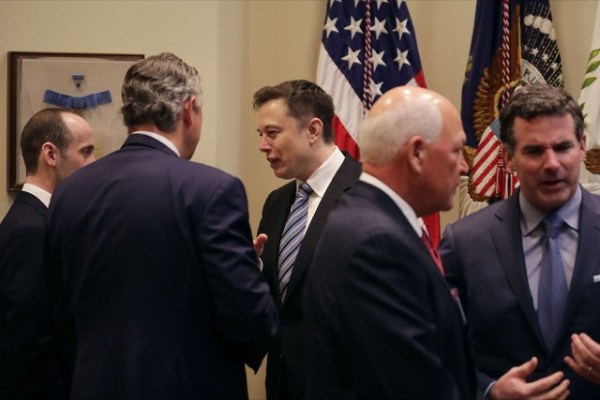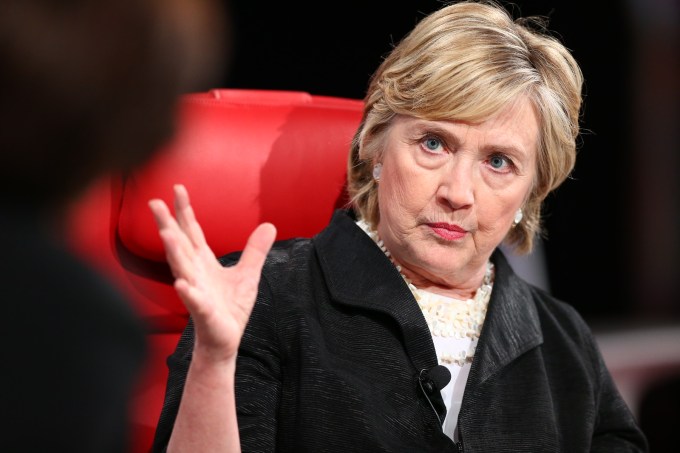This week President Trump made the senseless decision to withdraw from the Paris Climate Accord, prompting Elon Musk and Bob Iger to leave the White House advisory councils. Blue Apron filed for IPO, and Mary Meeker’s 2017 internet trends report was released. These are some of the top events that happened in tech this week (you also can get this post as a weekend newsletter sent to your inbox on Saturdays).
1. US withdrawal from Paris Climate Accord sparks pushback from Elon Musk and other corporate leaders
Elon Musk left President Trump’s White House advisory councils, he said today on Twitter. The Tesla and SpaceX CEO promised Wednesday he would step down from his official advisory roles with the administration should Trump go through with his plan to leave the Paris Climate Accord. Trump announced the U.S. would be removing itself form the agreement on Thursday, and Musk and Disney CEO Bob Iger have departed since then. Apple CEO Tim Cook also spoke out in a letter to employees, saying that he spoke with President Trump two days prior to the announcement and “tried to persuade him” not to withdraw, but “it wasn’t enough.” Major businesses and investors have come out against President Trump’s decision to withdraw from the Paris Climate Accord, as well.
2. Mary Meeker’s 2017 internet trends report arrives
Mary Meeker’s annual internet trends report was released, which is pretty much the State of the Union for tech. We broke down a few of the most noteworthy slides from the 355-page document and explained why they’re important. Some of the highlights are that e-sports is booming, smartphone sales and internet penetration are dropping, tech is shaping healthcare and Google and Facebook control 85 percent of online ad growth. You can read the whole thing here.
Blue Apron, the meal ingredient delivery service, filed to go public. The company’s financials are showing an incredible amount of growth. Blue Apron said it generated nearly $800 million in revenue in 2016, up from $341 million in 2015.
4. Andy Rubin’s Essential company unveils its first smartphone
Android creator Andy Rubin’s new company Essential unveiled its first smartphone alongside an Amazon Echo-like device and a new operating system called “Ambient.” On first impression, the phone is pretty stunning, and costs $699. It may be awhile, though, until it reaches consumer success.
Sprig, the startup that makes and delivers its own food, shut down. “It is with a heavy heart that my co-founders and I share that Sprig, Inc. will be shutting down the app today,” Sprig CEO Gagan Biyani wrote in an email to customers.
6. Silk Road creator sentenced to serve lifetime prison sentence
Silk Road creator Ross Ulbricht lost his appeal and will serve a life sentence in prison. Two years ago, Ulbricht was sentenced to life in prison for his role in running the dark web exchange, best known as a once-thriving online marketplace for drug transactions.
7. Uber’s head of finance is leaving
Uber’s head of finance, Gautam Gupta, is leaving the company in July. Gupta’s plan is to join another SF-based startup as COO. News of his impending departure comes as Uber has reported losses of $708 million. New documents also showed that Uber blew through $1 million a week in efforts to make UberPool viable in San Francisco.
8. Uber fires Anthony Levandowski
Uber has terminated the employment of Anthony Levandowski, the co-founder of self-driving trucking company Otto and Uber’s former self-driving project engineering lead. Levandowski is at the heart of an ongoing legal battle between Uber and Waymo, the Alphabet company that resulted from Google’s self-driving car project.
Weekend reads
Hillary Clinton appeared onstage at Code Conference to discuss the election. Mark Andreessen also spoke, calling Silicon Valley “extremely liberal.”
“Net neutrality is viewed by many as a bright spot in the otherwise rather dim and confused tech policies of the United States, and its enemies are subject to the harshest disdain. How, many ask, could anyone oppose such a simple, common-sense measure, except out of ignorance, avarice or both?” Read on in Commission Impossible: How and why the FCC created net neutrality.


